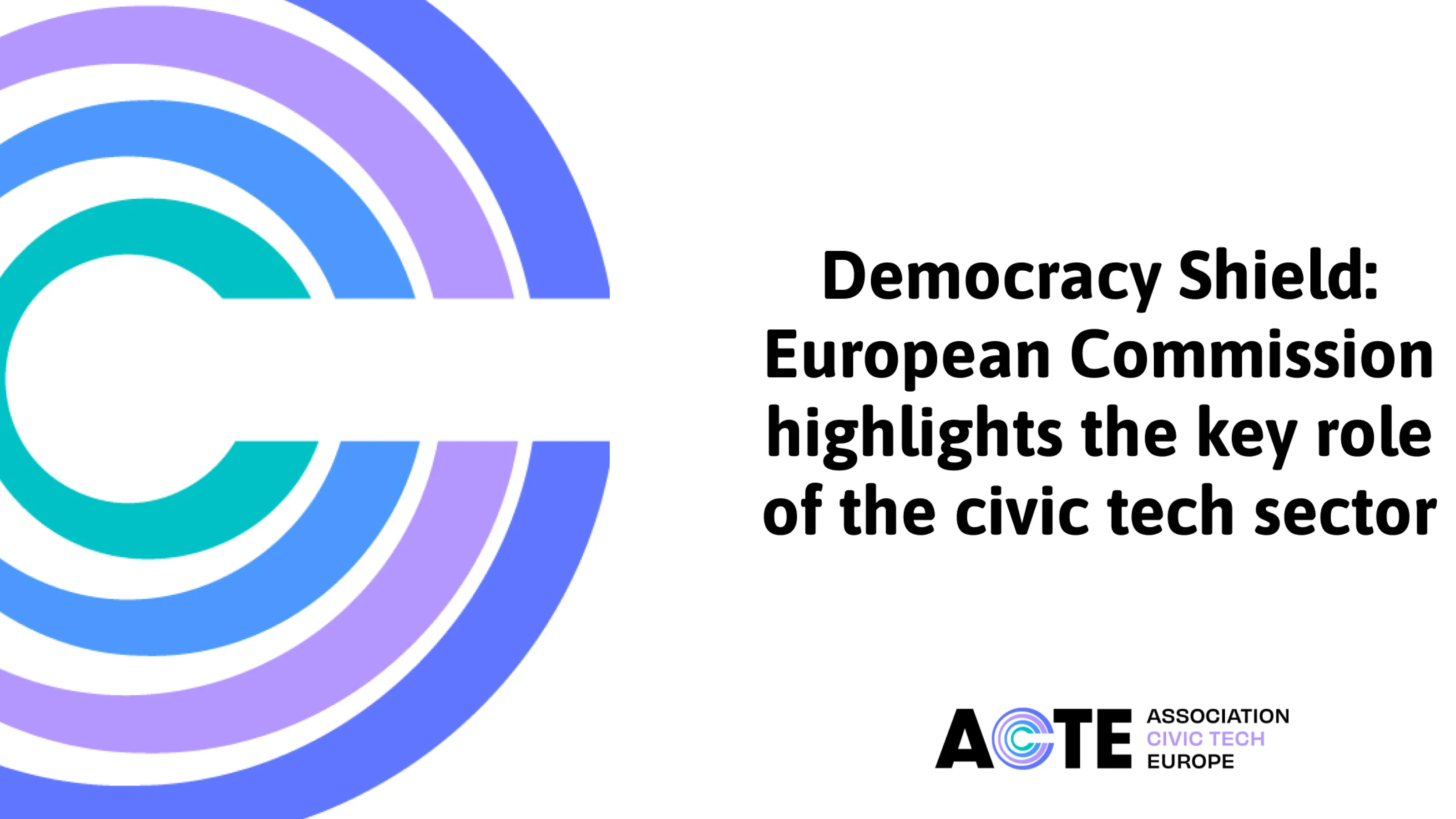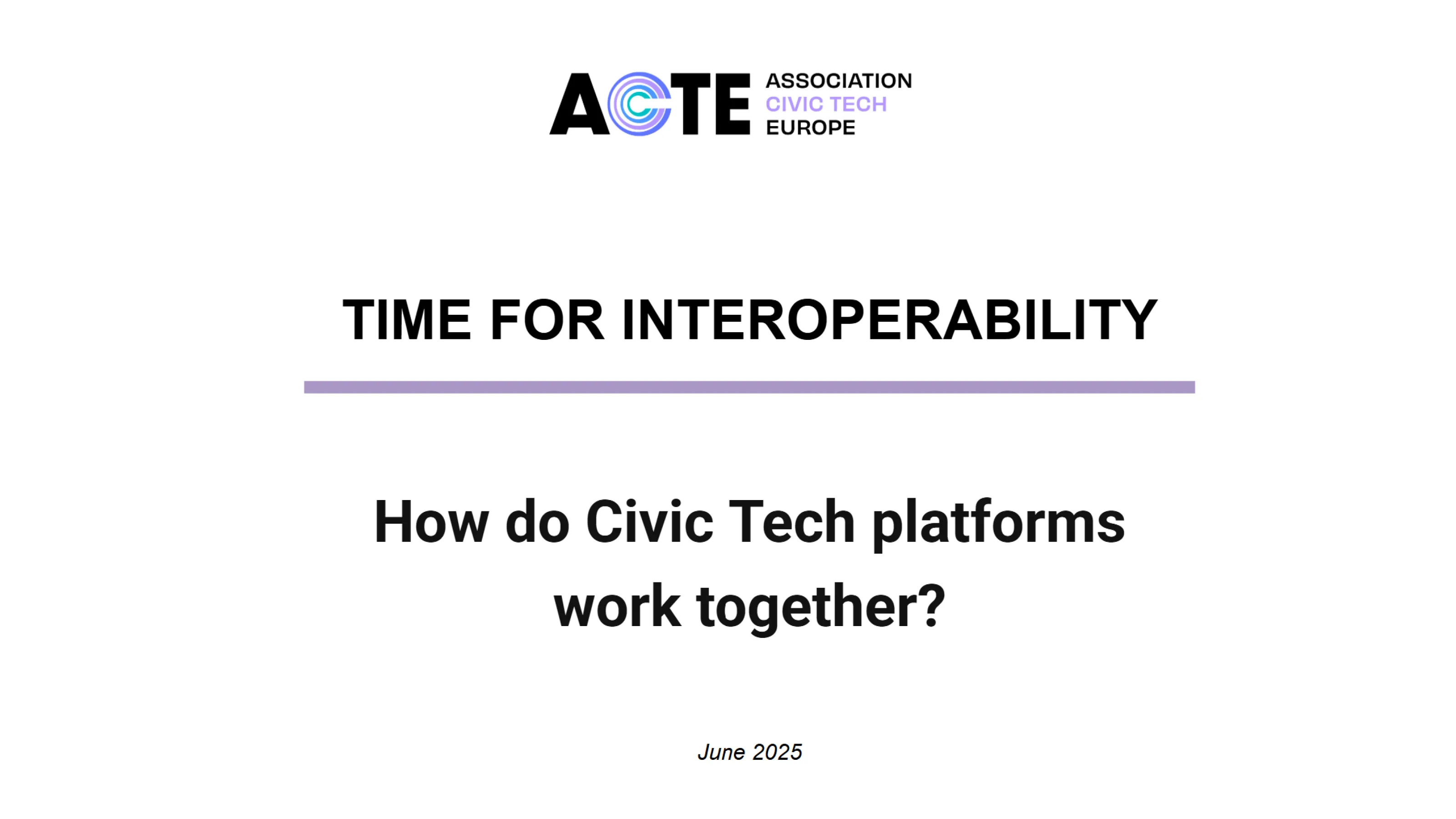This interview of Adrien Duguet, President of ACTE was conducted by Edward Strasser and published on Democracy Technologies website in March 2023
The Brussels-based Association Civic Tech Europe (ACTE) was founded in December 2019 to represent organisations developing civic and citizen-oriented technological solutions (civic tech) at the European level.
Democracy Technologies: What does ACTE do and why did you found this organisation?
Adrien Duguet: The main goal was to bring together all civic tech professionals across Europe to promote the sector and raise awareness about civic tech at the EU level. We have so far gathered around 20 members and partners. Our members are organisations, companies, heads of networks, working in the field of civic tech, or interested in democratic innovation. Our strategy is to advocate at the high-level meetings in Brussels.
DT: Where does ACTE currently stand?
Duguet: To reach our goals, we juggle between training for different stakeholders, public policies, social good economies, startups, and the activist world ecosystem. We strongly believe in the European model, in the knowledge and skills of the European actors. With regard to concrete issues, we examine how to tackle the coming European elections in 2024, or how to follow up on the great Conference on the Future of Europe held in 2021.
DT: Let’s talk a bit about the European civic tech market. How big is this market currently? What developments do you expect?
Duguet: We’re still speaking of something fairly new. Between 2010 and 2017, we already saw a bunch of civic tech projects from the non-profit world, from grassroots movements, or from committed citizens across Europe. However, only a few of them have successfully evolved into viable long-term business models. Around 2017, the market began to focus on services offered to communities, local and national governments. But the European market is still very much an array of national markets, and one of our jobs as an association is to build a market at the EU level, in order to generate the necessary funds to support a long-term R&D strategy. 2017 saw the first major gains for civic tech when a few of the most advanced providers succeeded in obtaining substantial funds for their projects.
DT: What is the size of the market?
Duguet: It depends on the way you look at it. If you define the civic tech market only as participative democracy platforms in Europe, it may be more than 50 million euros per year. This does not include related industries such as trainers or classical consultants. But if you consider all the projects which aim to develop citizen-centric services, that would be a much wider scope. I have no reliable figures because we lack studies so far.
DT: You said that one of your goals is to help build the European civic tech market. So, what should lawmakers in Europe do to help the market grow?
Duguet: Our main concern is large international players from the US and the UK, who are very strong in their home markets and who make big efforts to roll up the European market, from outside and from within. The European GDPR framework, the most protective in the world, efficiently helps to prevent individual privacy violations. But it does not answer all the questions regarding the European ethics of citizen participation and mobilization. So it leaves the European civic tech market wide open to players who adhere to different ethics and a different culture. So far, European lawmakers are not taking the problem seriously, and do not act to protect our political culture.
DT: What does that mean for lawmakers? Do you think we need more investment capital in Europe? Or more support for European companies from governments? Should European institutions support the growth of the European civic tech market?
Duguet: The first need is to recognise that civic tech markets have innovation goals apart from public sector control. We are strongly related to the public sector and offer very important services to the public sector. However, our ability to innovate has to remain separate. For that we need both the European institutions and the member states to help to fund this specific type of innovation, as well as related technologies. We are struggling to find funding from the classical world of tech because civic tech doesn’t have a high return on investment. Also, in civic tech, we tend to focus on local needs. But after having tried different models over the last ten years, we know what works, and what doesn’t. So it makes sense to scale up the best practice business models. But first, we must raise awareness of the issue among the EU leadership.
DT: I would like to move on to participatory budgeting. We have learned that cities are not satisfied with participation rates, which remain in the low single digits. So they try to raise these rates by lowering the participation threshold, i.e. making it as easy as possible for citizens to take part. This means not requiring formal registration and a validation of their status as citizens of that city. Is that a tendency you observe?
Duguet: Participation rates are low despite the efforts of communities to engage citizens by offering a platform where they can express their preferences. But we’ve learned from the past that there are no successful consultations in cities unless you have a strong long-term community management strategy. A lot of experiments are taking place about creating, monitoring, and mobilising small communities of citizens. These communities’ role would be to advocate for the results of these consultations to the rest of their city with modern tools of engagement, such as canvassing. This task has not been included in civic tech tenders in the past, but we are getting there. These are powerful tools for communicating with citizens. And budgetary matters are tangible subjects for citizen participation. However, we believe that this is only one subject for involving citizens in decision-making, among many others.
DT: What is your perception of the ID issue? Do cities tend to raise the threshold by introducing more security, or to make participation easier by lowering the threshold? Do you see a trend?
Duguet: For public decision-makers, ID verification and improvement of the anonymisation process are long-standing requests to lead certain consultations, in particular on sensitive topics. A growing number of civic tech platforms are supporting the trend and offer the ability to automatically verify ID. Thanks to the latest innovations, it is now also available in the case of hybrid voting operations (both physical and digital voting), where double voting has to be avoided. That being said, the use of security mechanisms is still a trade-off to be found for each consultation. It increases confidence in the vote but also lower participation.
There is still this common concern about civic tech: that by providing new possibilities of participation, we offer new opportunities to organised groups to bias the results. But at the local level, what we hear from our clients, malicious influence is a very marginal problem. What does happen is that local activist groups mobilise their sympathisers, and this may affect results, because participation, in general, is low. We can look at this as legitimate citizen mobilisation, and it did not start with the use of digital technology. It’s different at the national and European levels, where you want to be sure that the results of citizen consultations are not distorted by powerful well equipped organised lobby groups. For that problem, the civic tech sector has a set of technical solutions – for requiring ID, for detecting suspicious patterns, and other issues.
DT: I would like to move on to the voting market. Where do you see that market heading? Do you believe that online voting will become established in Europe?
Duguet: In most countries in Western Europe, confidence in the voting system, and in the results, is very high. That may change of course, seeing what’s happening in the world. But currently, it’s not a major issue in a lot of countries. The main issue is the rate of participation, and how to raise interest in the electoral process. As a professional, I think that e-voting could become standard in a few years. But in the general public, there are concerns about technology, and you also have to consider the symbolic importance of the vote with regard to a country’s traditions. So I’m not sure how it will evolve.
DT: Finally, what do you think is the main issue that lawmakers should be aware of in the coming years?
Duguet: I stated that already, but as it is the key factor, I will do it again. Lawmakers have to be aware that civic technologies are evolving very fast. We have to cope with the evolution of citizen engagement, and with progress in the area in other parts of the world. For that, we need funding and help from European lawmakers. We need them to recognise a sector which has been providing value to society for the last ten years. In another ten years, things may have evolved beyond imagination, and as an industry, we need to finance R&D in order to keep pace. Therefore we hope that lawmakers will recognise the role civic tech will play in a future society and the role that European industry must play in these developments.




